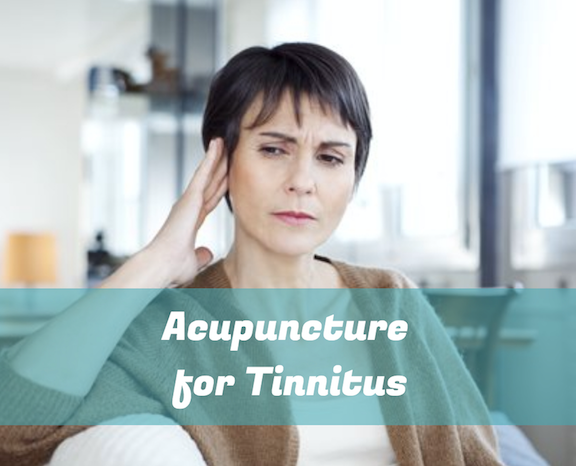According to the American Tinnitus Association (ATA), more than 50 million Americans (about 15% of the general public) suffer from some form of tinnitus, 20 million people suffer from chronic tinnitus, and 2 million people have extreme and impairing cases.
Acupuncture can be a great treatment option for individuals who have tinnitus that have exhausted other treatment methods. Medications, are often prescribed for tinnitus, but they can come with a plethora of unwanted side-effects. A safer alternative to treat tinnitus is acupuncture and Oriental Medicine.
What is Tinnitus?
Tinnitus is the perception of noise or constant ringing in the ears when no actual noise in being made. Most often referred to as “ringing in the ears,” tinnitus can show up as many different perceptions of sound such as buzzing, hissing, swishing, roaring, humming, clicking, and whistling. It can be chronic or acute, and heard in one or both ears either inside or outside of the head. There are some that hear multiple sounds & in very rare cases have said to hear music, and regardless of the sound, the pitch & loudness varies from person to person.
There are two types of tinnitus:
- Subjective Tinnitus: this is head or ear noises that only you can hear, and is the most common type of tinnitus making up over 99% of all tinnitus reported. This type is usually caused by auditory & neurological reactions to hearing loss in the outer, middle, or inner ear.
- Objective Tinnitus: this is head or ear noises that can be heard by other people as well as the individual. Only making up less than 1% of total tinnitus cases, the sounds heard in this type is normally produced by internal factors in the body’s somatic (musculo-skeletal movement) and circulatory (blood flow) systems. Objective tinnitus may be caused by a blood vessel problem, muscle contractions, or middle ear bone condition.
There is no known cure for tinnitus, although there are many treatments that can help, especially acupuncture. Tinnitus is often accompanied by several other disruptive symptoms such as anxiety, lack of concentration, insomnia, hearing loss, or dizziness.
There are several potential causes of tinnitus:
- Loud Noise – exposure to loud noises such as heavy equipment, chainsaws, firearms, explosions. Other more common causes like the loud sounds heard over a short period of time from something like a music concert, sporting event, or going to a club with loud music can cause tinnitus, however, these types of tinnitus usually go away. MP3 players or iPods can also cause this if they are played at too high of a volume for long periods of time. Both short- & long-term exposure can potentially cause permanent damage.
- Excessive earwax/earwax blockage – although earwax is in your ear to protect the canal from dirt and slows the growth of bacteria, the buildup of wax can muffle your hearing. It becomes much too hard to wash away naturally causing hearing loss & possibly irritation of the eardrum.
- Aging – the medical term for this is presbycusis & as adults age, usually starting around the age of 60, decreased hearing is often noticed.
- Ear bone changes – the condition of abnormal bone growth often runs in families, and is usually a stiffening of the bones in your middle ear affecting one’s hearing.
- Ear Infections – when there is an ear infection present, usually during a cold or the flu, nasal passages swell and increase ear/sinus pressure which can decrease hearing.
- Medications – certain medications such as antibiotics, diuretics, anti-inflammatory, aspirin, cancer drugs, or antidepressants can cause tinnitus.
- Medical Problems – Lyme disease, TMJ (temporomandibular joint), fibromyalgia, and Meniere’s disease, and high blood pressure (usually from stress, alcohol, or hardening arteries) can create side effects that cause tinnitus.
Western medicine has several options for treating tinnitus depending on the way the individual developed tinnitus, but for the most part there are some stand-by treatments.
Some western medicine treatments for tinnitus are:
- Hearing Aids
- Masking Devices
- Tinnitus Retaining Therapy
- Cognitive Therapy
- Biofeedback
- Vasodilator Drugs
What is interesting is that most of these techniques/treatments are ways to cope with tinnitus and/or reduce stress, not cure it. When medications are used, it is often to address the stress or anxiety which may be causing the tinnitus.
Acupuncture & Tinnitus
Acupuncture is an effective and viable treatment option for those who suffer from tinnitus. In traditional Chinese medicine, the main thing licensed acupuncturists will do is address & strengthen the root of the problem along with the problem itself. Essentially, acupuncture decreases the intensity of tinnitus and boosts the patient’s quality of life.
As far as acupuncture points, for the most part, they are focused on points in the ear. However, there are many very useful points outside of the ear as well.
Acupuncture points for tinnitus:
- KD3 – Great Ravine – Taixi – this point is located down by the ankle, and is used not only for tinnitus, but also for those symptoms that often accompany tinnitus like anxiety, insomnia, and dizziness.
- LI6 – Veering Passageway – Pian Li – this point is located slightly above the wrist, and is useful for tinnitus as well as deafness, jaw, teeth, & ears.
- SI19 – Auditory Palace – Ting Gong – this point is located just in front of the ear, and is used for tinnitus, deafness, hearing loss, inflammation, & TMJ. This point also calms the spirit.
- ST7 – Below the Joint – Xiaguan – located also in front of the ear close to the top of the cheekbone, and is used for tinnitus, deafness, hearing issues, ear pain, ear discharge/infections.
- UB8 – Declining Connection – Luo Que – located on the back of the head close to the top of the head, and is used for tinnitus, dizziness, nasal congestion, and a range of psychological conditions including depression.
Other acupuncture points are used and/or applied based on the individual. There are further points that are used for the treatment of tinnitus such as GB2 and TB21 as there are many blood vessels & nerves that pass through these acupuncture points such as the anterior superficial temporal vein, the anterior superficial temporal artery, the great auricular nerve, and the auriculotemporal nerve.
There are also other forms of acupuncture that are beneficial for different types of tinnitus. Stomach acupuncture can effectively treat nervous tinnitus (a type that is caused or increased by anxiety), and electroacupuncture to stimulate the acupuncture points around the ear. Electroacupuncture increases ear blood supply, activates local muscle contractions, and encourages nerve fiber regeneration.
Acupuncture for Tinnitus Research
There have been many studies performed over the last 15 years or so in regards to the effectiveness of acupuncture for tinnitus. They have all shown promising & positive results that lend themselves to further studies in the future.
2018 Acupuncture for Tinnitus Study:
- This study focused on the effect of acupuncture on chronic, non-pulsatile tinnitus and was a double-blind placebo-controlled clinical trial.
- Participants were separated into two groups: acupuncture & placebo. The acupuncture group contained 26 males and 18 females and the placebo group contained 27 males and 17 females; a total of 88 participants.
- They were treated in 15 sessions 3 times a week and visual analog scale questionnaires for tinnitus loudness & tinnitus severity index were completed at the end of the 15 sessions as well as 3 weeks after completion.
- This study concluded that acupuncture is more effective than placebo in reducing the loudness and severity of tinnitus and can be a useful treatment option beyond when treatment ends.
2019 Acupuncture for Tinnitus Study:
- This study analyzed the relationship between treatment outcomes and clinical characteristics of patients with tinnitus. Additionally, this study compared the effectiveness of acupuncture between two groups with different acupuncture point combinations.
- Patients who had subjective tinnitus and received acupuncture treatment from May 2012 to August 2017 were reviewed & those who had undergone other therapies were excluded from the review. When acupuncture was given patients were divided into periauricular points (PA) group and the periauricular points plus distal points (PADA) group. Patients received acupuncture once or twice a week.
- The review concluded that the combination of periauricular and distal acupuncture points, along with the patient receiving 17-24 acupuncture sessions had a significantly better outcome in the treatment of tinnitus.
There are many more studies out there that address the effectiveness of acupuncture for tinnitus. Many of them are smaller scale studies, and with the promising results these studies are showing, it lends room for more high-volume studies to be performed.
Acupuncture & Tinnitus
Acupuncture works for the treatment of tinnitus, and regardless how long it lasts, tinnitus can be a significant disruption on an individual’s daily life. While there are other home remedies that are said to help prevent/treat tinnitus such as magnesium, minerals & vitamins, and black coffee, acupuncture is a tried and true treatment method for tinnitus. Additionally, seeing a licensed acupuncturist for tinnitus will give the added benefit of treating other potential issues going on in your body that you weren’t necessarily aware of like anxiety & stress which, interestingly enough can lead to tinnitus. Acupuncture can treat the entire body in addition to the condition of tinnitus which makes it a positive treatment option for those seeking a resolution to the “ringing in their ears.”

Acupuncture Near Me
Get acupuncture near you today with Best Acupuncture Near Me, and contact a local acupuncture practitioner to find out if acupuncture is right for you.

